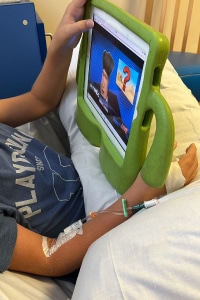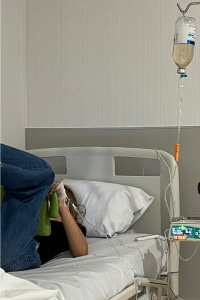CONTACT
We will reply as soon as possible.
Enevia Health, LLC
30 N Gould Ste N, Sheridan, WY 82801, USA
In order to protect the identity of the people who have shared their experience, information such as names and addresses has been modified and omitted. The images found on this blog are actual images provided by the girl's guardian.
Pilar tells us the results she has seen in her daughter Matilde during the administration of the 6th and 7th doses intravenous immunoglobulins (IVIG). as well as the decision to give Valtrex (antiviral medication) again.
Matilde, Pilar's daughter, with a diagnosis of autism questionable, in this update they tell us about the possible finding related to immune system dysfunction by Matilda and the possible creation of autoantibodies against Interferon preventing defense against viruses such as herpes (HHV6 and HHV7).
Follow the case from the beginning through this link.
During the 6th and 7th doses of intravenous immunoglobulins we did not notice any progress, In fact we were worried because he didn't seem to be getting better and seemed to be having more bouts of infections than normal, he had plateaued.

After a consultation with one of the professionals handling my daughter's case, we decided to take back the VALTREX (Antiviral medication), I had the feeling that my daughter's condition had worsened since we stopped the medication a few months ago.
We resume VALTREX 10 days before the 7th dose of IVIG, and the advances returned. The most noticeable thing is her condition, she is much calmer, she has fewer tantrums, she is more flexible, when she is told to do something she does not want to do, she protests much less.
On the other hand, at a cognitive level, we see more use of language to communicate, more elaborate sentences and above all an increase in understanding, she is more independent, she is more attentive at school and in therapies.
In the case of my daughter, the viruses that tested positive are herpes Virus 6 and 7. Even though she was giving Valtrex for more than 6 months, herpes 7 continued to test positive (PCR positive) and herpes 6 in quantitative PCR was negative. .
I'm starting to think that Maybe my daughter's problem is this chronic viral load. Understanding how a cell infected by HHV6 or HHV7 behaves is not easy. All the literature I find describes acute infectious processes, where the patient suffers a momentary infection. In the case of my daughter and many like her, I think it is a chronic low-grade infection that infects cells of the immune system and nervous system, causing these systems to malfunction.
I want to think that What immunoglobulins are doing is repairing the body's defense system making it more effective when it comes to fighting infections and locating attackers that are inside the body's own cells in a state of semi-latency waiting for the moment when the immune system lowers its guard a little more to cause even more damage. .
By giving Valtrex, we manage to stop viral replication (we prevent certain viruses from multiplying) and we allow the immune system to modulate (thanks to the effect of IVIG and the reduced viral load).
From what I see in my daughter, if there is no replication (that is, an increase in the viral load) or there is less, she is better, which leads me to think that these viruses are actively affecting my daughter.
The immune system has multiple defense mechanisms, and I wonder:
My daughter's doctor posed a hypothesis to this question, according to him the inefficiency of my daughter's immune system against viral infections could be explained if it had produced autoantibodies against Interferons.
As I have explained before, Interferons are a defense mechanism of the immune system to protect cells against virus infection, but:
Interferons (IFNs): These proteins are released by cells in the presence of pathogens (such as viruses, bacteria) or tumor cells. They activate the protective defenses of the immune system. Types include IFN-alpha, IFN-beta, and IFN-omega, each with specific roles.
An antibody is a specialized protein of the immune system that is responsible for identifying and neutralizing foreign substances, such as bacteria, viruses and toxins.
Its main functions are:
They are antibodies that mistakenly attack a person's tissues or organs, a characteristic of autoimmune diseases.
In the case of autoantibodies against Interferon 1, these block the normal functions of interferon, preventing:

The doctor proposed that we test these antibodies against interferon 1 to see if his hypothesis was confirmed. The results came and he tested positive for INTERFERON 1 Omega (IFN-ω).
1. Antiviral Activity: Like other type I interferons, IFN-ω is primarily known for its potent antiviral properties. It is produced in response to viral infections and works to inhibit viral replication within host cells. By binding to specific receptors on the cell surface, it activates a signaling pathway that leads to the expression of several genes that hinder viral replication and spread.
2. Modulation of the Immune System: IFN-ω modulates the immune system by influencing the activity of various immune cells. Improves the ability of cells such as macrophages and natural killer cells to respond to infections. This includes enhancing the ability of these cells to recognize and destroy infected cells or pathogens.
3. Antitumor Effects: There is evidence to suggest that type I interferons, including IFN-ω, may have antitumor effects. They may inhibit the growth and proliferation of certain cancer cells and may play a role in improving the immune system's ability to attack and destroy cancer cells.
4. Influence on Adaptive Immunity: IFN-ω can influence the adaptive immune response (the part of the immune system that has 'memory' of past infections). It affects the differentiation and activity of T and B cells, which are crucial for long-term immunity and the production of specific antibodies against pathogens.
5. Regulation of Other Cytokines: Interferons, including IFN-ω, can regulate the production of other cytokines, which are signaling proteins that mediate and regulate immunity, inflammation, and hematopoiesis. This regulation is important to maintain the balance of the immune response and prevent excessive inflammation.
6. Antiproliferative Effects: Aside from their role in immune defense, interferons such as IFN-ω can exert antiproliferative effects on cells, meaning they can inhibit cell growth and division. This property is particularly relevant in the context of cancer therapy.
We are currently awaiting another analysis to reconfirm the autoantibody results.
If the autoantibodies against Interferon Gamma are confirmed, it could explain my daughter's chronic viral infection and also if giving her VALTREX and reducing the viral load (she improves) I wonder if she would improve even more if we could address these autoantibodies that are preventing her immune system deal with infections.
We leave you here a link to an Instagram post where more is explained about IVIG. What is it? Its function and use as a treatment for systemic inflammation.
Also in our blog You can find articles related to these topics and other health areas.
We will reply as soon as possible.
30 N Gould Ste N, Sheridan, WY 82801, USA
Our groups are the ideal platform to learn and share your scientific concerns about neurodevelopment issues
*Our purpose is informational only, it is not intended to be a substitute for medical advice, diagnosis or treatment.
We are working on our website. For any queries, you can contact our customer service team at atencionalcliente@eneviahealth.com